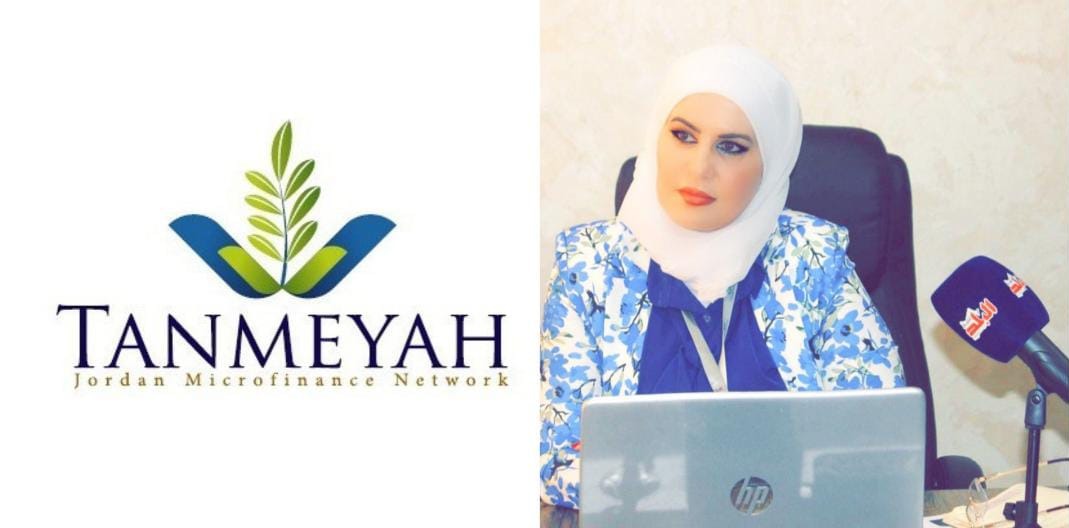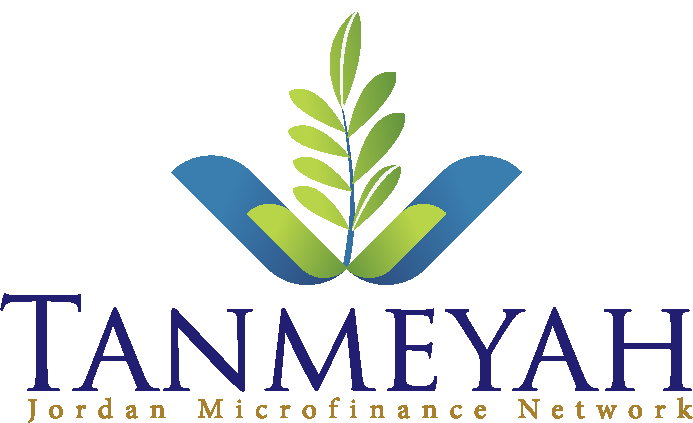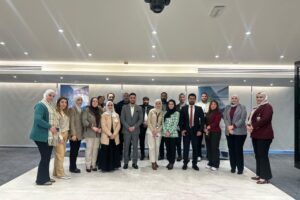
Nisreen Al-Khasawneh in a comprehensive discussion about microfinance companies in Jordan.
Press Release Link:https://albaladnews.net/article/394307
Khasawneh: “Tanmeyah’s role lies in advancing microfinance and achieving sustainable development in Jordan.”
“What distinguishes Tanmeyah members is their extensive reach across the Kingdom’s governorates and remote areas, alongside their financial and administrative independence.”
“Building a Sustainable Business Environment: Tanmeyah’s Strategy to Strengthen the Microfinance Sector in Jordan.”
In an exclusive and insightful interview, Dr. Nasreen Al-Nasser Al-Khasawneh, General Manager of Tanmeyah – the official Microfinance Network in Jordan, spoke about the network’s role in enhancing and growing Jordan’s economy and developing the microfinance industry in the Kingdom.
When and why was the Tanmeyah Microfinance Network in Jordan established? What is its significance in Jordan’s national economy?
Dr. Nasreen highlighted the beginnings of the microfinance sector in Jordan in the mid-1990s. Tanmeyah was established in 2007 as a formal, nonprofit entity registered under the Ministry of Industry and Trade, replacing the Microfinance Association. The network aims to develop a sustainable microfinance industry and integrate it into Jordan’s formal financial system. Tanmeyah supports the sector by raising awareness of microfinance’s importance in combating poverty, fostering entrepreneurship, and promoting self-employment and innovation. These efforts address unemployment and contribute to economic growth.
Tanmeyah also participates in creating a favorable regulatory environment for the sector and provides essential data, benchmarks, and performance standards, benefiting the microfinance sector at large.
What is the importance of Tanmeyah, and what does it focus on?
Tanmeyah’s strength lies in its position as the official representative of the microfinance sector in Jordan. Its pillars include:
- All members are licensed by the Central Bank of Jordan.
- The high professional reputation of microfinance institutions (MFIs) – Tanmeyah – in managing micro and small enterprises, as well as their provision of non-financial services to clients. These services include organizing special bazaars, awareness and educational campaigns, and offering in-kind assistance such as grants and awards for clients and their families.
- Official representation of the sector before legislative bodies, including the Central Bank of Jordan, the Jordanian government, ministries and official departments, international, local, and regional organizations, as well as civil society associations and organizations.
- Enhancing economic growth rates, reducing poverty and unemployment, and improving the living standards of local communities.
- Issuing and regularly updating sector reports through the periodic and annual sector performance reporting system, which is based on key industry indicators. Notably, the performance reporting system has recently been automated.
- Extensive sector-wide presence across the Kingdom, with 212 branches distributed throughout Jordan.
- A large number of active clients, reaching 456,511 by the end of 2023, securing a significant market share.
- Specialized products designed for women, with female clients making up 61% of the total, spread across various governorates.
- Targeting marginalized groups that are excluded from banking services, representing the majority of the Jordanian population.
- Supporting innovation and youth entrepreneurship while creating opportunities for self-employment.
- Non-financial services provided to clients: Microfinance companies continuously enhance their efficiency by leveraging available technological tools to digitize their operations. This allows them to reach a greater number of target clients through electronic channels for payment processing and monthly installment collections. These advancements improve the efficiency of microfinance institutions while reducing operational costs. Moreover, the microfinance industry is backed by well-defined social protocols and standards, ensuring responsible financing models aligned with global best practices. This approach guarantees carefully designed, responsible financing aimed at driving the desired positive change in local communities.
- A network of Tanmeyah trainers and experts capable of designing various training programs for different job levels.
- A collaborative effort between Tanmeyah and its microfinance institution members.
What services does Tanmeyah provide to its member institutions?
Tanmeyah offers a range of services, including:
- Conducting Research, Reports, and Market Studies:
Tanmeyah conducts quarterly, semi-annual, and annual studies and research that reflect the performance of the microfinance sector. These studies provide data-driven insights into the development of microfinance institutions, enabling them to make informed expansion decisions and optimize their market presence. Additionally, market studies help assess client demand for microfinance services, aligning with modern trends in digital and technological service delivery. Tanmeyah also conducts opinion polls and surveys to evaluate customer satisfaction, understand their financial needs, and gauge their awareness of the microfinance sector in Jordan. - Establishing a Comprehensive Reference Database:
Tanmeyah provides an integrated database for the microfinance sector, facilitating better market analysis and enabling microfinance institutions to design financial products and services that align with client needs. The database also supports expansion decisions, ensuring wider financial inclusion. It serves as a digital platform where the latest sector-related information is published, and microfinance institutions can upload their data directly. Notably, the sector’s performance reporting system has been automated to generate comprehensive digital reports. - Capacity Building for Microfinance Sector Employees:
Tanmeyah organizes various training programs for sector employees based on identified training needs. These programs aim to enhance their ability to deliver financial services within a framework that adds greater value to clients. - Advocacy and Support:
Tanmeyah proactively engages with relevant stakeholders (government entities, the Central Bank of Jordan, and financial supporters) to advance the interests of the microfinance sector. It also works through communication channels to establish a legal framework that enables the introduction of new financial products catering to diverse client needs, contributing to greater financial inclusion. - Raising Awareness About the Microfinance Sector in Jordan and the Quality of Services Provided:
Tanmeyah strives to enhance financial literacy among both current and potential clients across various demographics and geographic locations. This is achieved through targeted awareness campaigns via direct and indirect communication channels, including television, radio, social media, and other platforms. The goal is to educate clients and economic policymakers about microfinance, improving financial awareness among the target audience. - Enhancing Transparency and Good Governance in the Sector, and Developing Local, Regional, and Global Partnerships.
- Encouraging Innovation and Entrepreneurship.
- Promoting Self-Employment and Entrepreneurship to Combat Poverty and Unemployment:
Tanmeyah supports individuals in pursuing self-employment opportunities, enabling them to establish and grow their businesses. There are numerous success stories from clients who have transformed their financial situations through microfinance initiatives.
Key Opportunities and Challenges in the Jordanian Microfinance Sector
The Jordanian financial market is a promising one, supported by the financial inclusion strategy recently launched by the Central Bank of Jordan. This strategy considers the microfinance sector as a strategic partner in achieving high rates of financial inclusion in terms of access and demographic outreach. However, there are some challenges facing the sector:
- High financing costs for institutions, which pushes institutions to enhance pricing efficiency for microfinance companies.
- The political and economic situation, which leads borrowers to fail in meeting their obligations.
- High costs of training and conducting workshops, especially in remote and distant areas in the south.
- The entrepreneurial environment for business owners and small-scale production project owners.
Awards Received by Tanmeyah
We would like to highlight the two international awards won by Tanmeyah – the Jordan Microfinance Network:
- The Business Excellence in Work and Community Service Award.
- The Outstanding Institutional Leadership Award for the General Manager of the Network, Ms. Nasreen Al-Khasawneh.
These awards are granted by the World Confederation of Businesses (WORLDCOB) to leading institutions serving their local communities and fostering innovation. Tanmeyah received these two awards among 3,500 international entities after a long evaluation process, which included assessment interviews with the General Manager, Ms. Nasreen Al-Khasawneh, conducted by a jury and a team of international experts specialized in award criteria.
The awards are based on six key areas: modern leadership and administrative systems, networking and social integration plans, capacity building, sustainability plans, innovation and creativity, social responsibility, and employment.
Tanmeyah will be honored at a grand ceremony in Singapore this year, attended by a distinguished gathering of international business leaders.
What are the main strategic priorities for the microfinance sector in Jordan, and how does Tanmeyah plan for the next five years?
Tanmeyah seeks to provide a more sustainable business environment that is better suited for microfinance companies in Jordan and their stakeholders, including employees and clients. Based on this vision, Tanmeyah has launched its five-year strategic plan in conjunction with a sector needs assessment and an analysis of the challenges facing all relevant stakeholders, followed by a prioritization process.
Accordingly, Tanmeyah has developed an integrated framework of activities and initiatives, which has been shared with relevant partners and stakeholders as part of its participatory approach. These activities are managed and implemented by specialists and include the following: training programs for sector employees, workshops and dialogue sessions for clients and employees on emerging sector-related topics, awareness and educational events for clients across the Kingdom, joint conferences with both the public and private sectors, job fair projects in governorates and remote areas in collaboration with the Ministry of Interior, the Ministry of Labor, and public and private universities, hosting regional conferences such as the 16th edition of the Sanabel Regional Conference—set to take place this month under the patronage of the Governor of the Central Bank—organizing client bazaars, publishing periodic sector reports and conducting expert interviews (podcasts), and strengthening Tanmeyah’s media presence and promotion of its services.
Through this approach, Tanmeyah demonstrates its unwavering commitment to enhancing the microfinance industry in Jordan and ensuring economic and social sustainability across the Kingdom.



